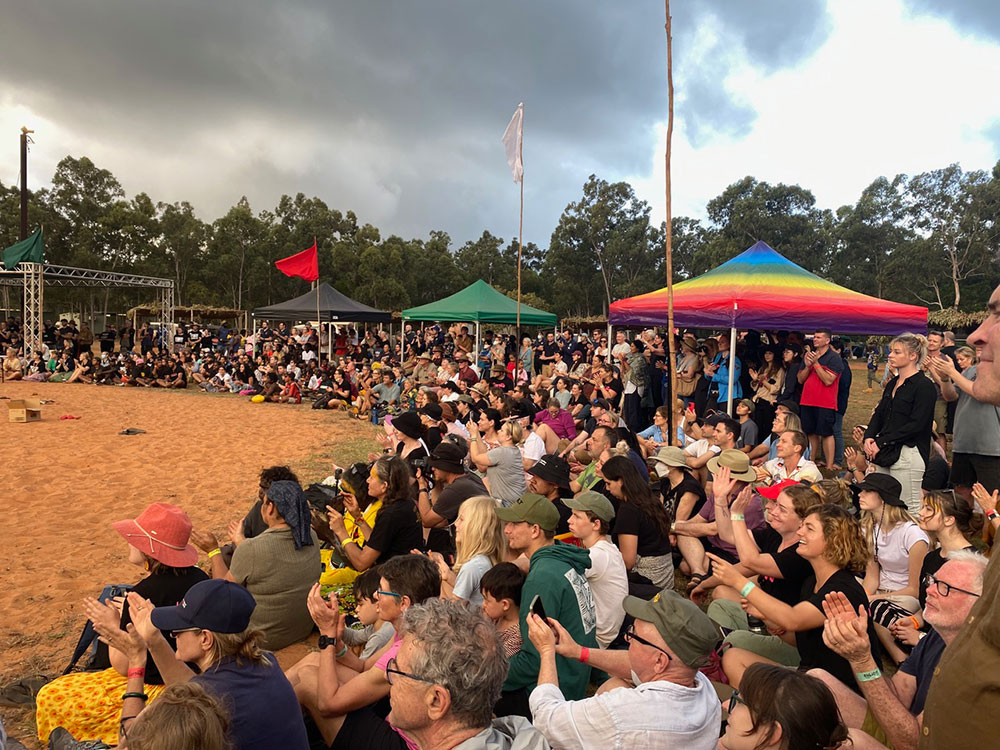There is news from the Fatal Shore and it fills me with dread.
In my hometown of Adelaide, South Australia, Prime Minister Anthony Albanese announced this week that Australians will vote in six weeks on a constitutional amendment that would give Indigenous people a permanent voice in the country’s affairs. It would establish “a committee of Indigenous Australians chosen by Indigenous Australians, giving advice to government so that we can get a better result for Indigenous Australians.”
The announcement came six years after a large consensus of First Nations people in Australia released the Uluru Statement from the Heart — a moving plea for substantive recognition of Aboriginal and Torres Strait Islanders as Australia’s First Peoples, and a proposed pathway to better outcomes for some of the so-called “developed” world’s most marginalized people.
The statement came after decades of frustration at the criminally paternalistic treatment of people who had prospered for thousands of years before being colonized a couple of hundred years ago by the British, who then tried to eradicate them from their unceded lands and waters. When that failed, they imprisoned them, stole their children, and otherwise largely ignored their plight and were deaf to their entreaties. Sound familiar?
With the election of Anthony Albanese’s Labor Party last year came a promise that his government would be different. As good as his word, he committed to putting the voice to a vote and that vote takes place on Oct. 14.
It will be, Albanese said, “a once-in-a-generation chance to bring our country together.” Oh, if only that were so.
Just 10 weeks after Labor’s victory last year, Albanese made a pilgrimage to Arnhem Land in Australia’s far north where, at the Indigenous-led and internationally renowned Garma Festival, he promised to put the voice to a vote in his government’s first term in office.
It was an exhilarating moment, one I was lucky enough to witness first-hand as a guest of the festival. Finally, here was a prime minister who stood before some of the most senior traditional owners in the land and had the moral courage to commit the country to taking an essential first step towards honouring the Statement from the Heart.
History was being made right there and then, all the more spine-tingling because it seemed to signal a sea change in Australian cultural, economic and political life. The reaction of people there was joyful, buoyant, almost rapturous, the ceremonial dances and music a perfect accompaniment to a momentous shift in the nation’s political consciousness.
But while the excitement in Garma was real, it was tempered by the fact that in the faraway cities and the country towns where the voters were, bipartisan support wasn’t a sure thing.
It turns out it was no thing at all.
Given a chance to join forces with Labor and champion a “Yes” vote in the coming referendum, the recently deposed coalition of Liberals (read Conservatives) and Nationals (read rural Conservatives) opportunistically opted to aggressively oppose the voice. They found willing support from the ironically soi-disant Fair Australia, an arm of a conservative lobby group called Advance. According to the Guardian, “The groups have deep links to a number of conservative Christian organizations and consultancies, and have been accused by the government of importing ‘Trump-style’ political campaigning to Australia.”
Far from fostering unity, the very idea of according First Nations even a merely consultative role in how to better serve the most persistently disadvantaged people in the country has triggered fear mongering, disinformation and heartbreaking displays of bigotry that have poisoned the public discourse in Australia, possibly beyond repair.
One leading “No” campaigner, former Labor politician Gary Johns, “denied he had anything to apologize for after suggesting Indigenous people should undergo blood tests to access welfare benefits,” the Guardian reported. “’If you want a voice, learn English. That’s your voice,’ Johns told an audience of conservatives.”
Polls show that support for the “Yes” campaign, which started out with a percentage in the mid-60s, has dropped as low as the mid-40s. That matters a lot, because a change to the Australian constitution can only be made by way of a referendum. To pass, an amendment must be approved by a double majority, i.e. a majority of voters nationally, as well as in at least four of the country’s six states. Since 1901, only eight of 44 proposed constitutional changes have been approved. In the last referendum, in 1999, Australians voted no to becoming a republic — to instead remain loyal to the monarchical system that colonized Australia in the first place.
Even if it does pass — and the “Yes” side has the resources of government and much of corporate Australia to run an intense campaign for undecided votes in the coming six weeks — the battle for a simple voice in the country’s affairs has proven that a huge number of outwardly fair-minded but preternaturally intolerant Australians really do have a xenophobic fear of what Indigenous leader Noel Pearson has described as Australia’s “most unloved people.”
And if it doesn’t pass? Larissa Baldwin-Roberts from the Widjabul Wia-bal mob, who is chief executive of the activist group GetUp and a leading advocate for the “Yes” side, told the New York Times, “I really believe that we are almost within Australia’s Brexit moment here, if this goes negatively. There’s going to be a lot of regret. It’s going to impact the political psyche of this country and how we move forward together. On an international level, how will people perceive Australia as a nation if a ‘No’ vote happens? There’s not going to be the nuance of what happened in the debate, what was the misinformation. It’s just going to be seen for what it is: a rejection of First Nations people by Australian voters.”
If that happens, it will mirror Brexit demographics, too. Younger people want to hear the voice of Indigenous people in Australia much more than older people who, just like with Brexit, will be around a lot less time to have to live through the consequences of a vote that could do the opposite of what Anthony Albanese dared Australians to rally around.
For all the talk in international Indigenous circles of land back and rights and reconciliation and decolonization, if Australians silence the voice it will amount to nothing short of a recolonization of Indigenous people in a constitutional monarchy governed by a parliamentary democracy upholding the supremacy of the Crown. It will be a state-sanctioned national repudiation of decades of work to make Australia, and the world, a fairer place.
Australians have been asked to pay proper attention, for once, to First Nations who have struggled for generations to be heard. The French philosopher Simone Weil once wrote, “Attention is the rarest and purest form generosity.” You could argue whether voting “Yes” is an act of generosity or simply the fair and just thing to do. But what is clear is that to do otherwise is to invite the opprobrium of the world, and to add to the ugly history that has been a defining stain on the sunlit shores of the Lucky Country for two centuries and counting. ![]()
Read more: Indigenous, Rights + Justice, Politics

















Tyee Commenting Guidelines
Comments that violate guidelines risk being deleted, and violations may result in a temporary or permanent user ban. Maintain the spirit of good conversation to stay in the discussion and be patient with moderators. Comments are reviewed regularly but not in real time.
Do:
Do not: